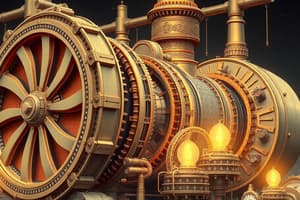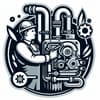Podcast
Questions and Answers
The air-fuel mixture is crucial for combustion and should have a precise ratio for optimal engine performance.
The air-fuel mixture is crucial for combustion and should have a precise ratio for optimal engine performance.
True (A)
Fuel injection systems are designed to enhance fuel atomization and mixing, leading to lower combustion efficiency.
Fuel injection systems are designed to enhance fuel atomization and mixing, leading to lower combustion efficiency.
False (B)
Regular replacement of fuel filters is essential to prevent contaminants from damaging the engine.
Regular replacement of fuel filters is essential to prevent contaminants from damaging the engine.
True (A)
Multi-Point Injection (MPI) involves injecting fuel directly into the combustion chamber.
Multi-Point Injection (MPI) involves injecting fuel directly into the combustion chamber.
Fuel pumps are responsible for moving fuel from the engine to the fuel tank.
Fuel pumps are responsible for moving fuel from the engine to the fuel tank.
Direct Injection (DI) provides higher efficiency for gasoline engines by injecting fuel into the cylinders.
Direct Injection (DI) provides higher efficiency for gasoline engines by injecting fuel into the cylinders.
Central Injection (CI) systems are primarily used in gasoline engines and are ineffective for diesel engines.
Central Injection (CI) systems are primarily used in gasoline engines and are ineffective for diesel engines.
Fuel filters can help improve fuel economy by ensuring the fuel system operates efficiently without contamination.
Fuel filters can help improve fuel economy by ensuring the fuel system operates efficiently without contamination.
Flashcards
Fuel Supply System
Fuel Supply System
Delivers fuel to the engine for combustion and power generation.
Air-Fuel Mixture
Air-Fuel Mixture
Essential blend of air and fuel for engine combustion.
Fuel Injection Systems
Fuel Injection Systems
Inject fuel directly into engine, replacing carburetors.
Multi-Point Injection (MPI)
Multi-Point Injection (MPI)
Signup and view all the flashcards
Direct Injection (DI)
Direct Injection (DI)
Signup and view all the flashcards
Fuel Filters
Fuel Filters
Signup and view all the flashcards
Fuel Pumps
Fuel Pumps
Signup and view all the flashcards
Engine Management Systems (EMS)
Engine Management Systems (EMS)
Signup and view all the flashcards
Study Notes
Fuel Supply System of Automobiles
-
The fuel supply system in automobiles is crucial for delivering fuel to the engine, enabling combustion and power generation.
-
It comprises various components working in coordination to ensure efficient and reliable fuel delivery.
Air-Fuel Mixture
-
The air-fuel mixture is the essential blend of air and fuel necessary for combustion within the engine's cylinders.
-
Crucial for optimal engine performance and fuel efficiency.
-
The precise ratio of air to fuel is critical, impacting emissions and engine output.
-
Engine management systems (EMS) constantly monitor and adjust air-fuel ratios in real-time.
Fuel Injection Systems
-
Fuel injection systems directly inject fuel into the intake manifold or cylinders, replacing the older carburetor systems.
-
This method enhances fuel atomization and mixing, leading to better combustion efficiency and reduced emissions.
-
Types of Fuel Injection Systems:
-
Multi-Point Injection (MPI): Fuel is injected into the intake manifold ports, providing a standardized fuel distribution to different cylinders.
-
Central Injection (CI): Fuel is injected directly into the combustion chamber, facilitating precise fuel atomization and combustion. Often found in diesel engines, though also used alongside gasoline engines.
-
Direct Injection (DI): Inject fuel directly into the cylinders. Provides very precise control over mixture and higher efficiency compared to other injection systems, particularly for gasoline engines.
-
-
Advantages of Fuel Injection:
- Improved fuel efficiency due to precise fuel delivery.
- Reduced emissions and enhanced fuel economy.
- Improved engine responsiveness and acceleration.
- Enhanced control over combustion.
Fuel Filters
-
Fuel filters are essential components of the fuel supply system.
-
They remove impurities such as dirt, water, and other contaminants from the fuel.
-
Contaminants can damage the engine and reduce its performance.
-
Regular fuel filters replacement is critical for maintaining the fuel system's efficiency and engine health.
-
Different types of fuel filters exist catering to different automotive applications.
-
Critical for preventing engine damage and ensuring optimal fuel system functionality.
Fuel Pumps
-
Fuel pumps are responsible for moving fuel from the fuel tank to the engine.
-
They utilize various methods, including mechanical and electric pumps, to accomplish this task.
- Mechanical fuel pumps: Historically used in older vehicles, powered by the engine's crankshaft.
- Electric fuel pumps: Found in modern vehicles, providing more consistent fuel delivery and less mechanical wear.
-
Types and characteristics vary by the application and the type of fuel system.
-
Critical components for reliable fuel flow and engine operation.
-
The fuel pump's pressure capacity and flow rate are crucial aspects for functionality.
-
Efficient fuel pumps are crucial for maintaining optimal operation for the entire system, from the fuel tank to the engine injection area.
Studying That Suits You
Use AI to generate personalized quizzes and flashcards to suit your learning preferences.





